In the months since January 6, militia movement supporters have shifted their approach to propaganda and organizing
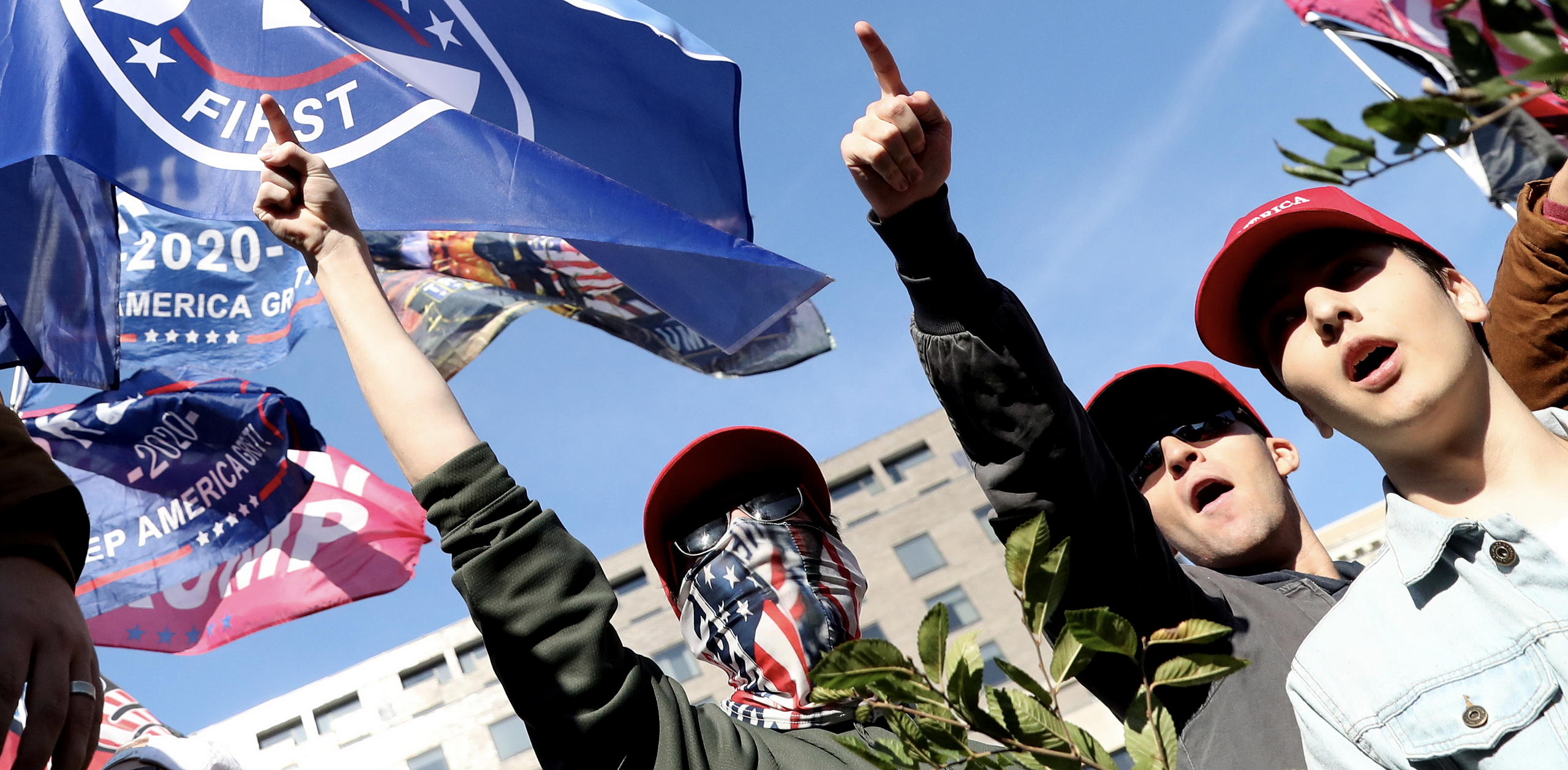
By Avani Yadav and Jared Holt
Unlawful militia movement groups appeared more prominently in the public spotlight after several individuals affiliated with organized movement groups were criminally charged for their participation in the insurrectionist attack on the US Capitol on January 6, 2021. The increased public attention and scrutiny bearing upon domestic militias since the Capitol attack has prompted large swaths of its supporters to alter their approaches in the digital arena as it concerns organizing and propagandizing.
The DFRLab identified eight notable trends currently present in the movement’s online nexus since the Capitol attack: three pertain to shifts in the layout of networked militia supporters online and five pertain to propaganda narratives echoing throughout the content within those networks. The DFRLab is providing a representative set of examples in this article to illustrate what these trends take when translated into online content. These trends exist in addition to longstanding narratives in the militia movement predicting imminent widespread civil disorder and opposing any form of gun control.
Political narratives within militia movement communities online have in many aspects returned to a state predating the 2020 election, a time period during which militia organizing online saw a surge in participants and militia groups made headlines for self-deploying to racial justice protests. In 2020, three major trends increased the foothold of militia movements in the United States: opposition to COVID-19 restrictions on businesses and gatherings; outcry over racial justice protest movements following the police murder of George Floyd; and right-wing mis- and disinformation about the 2020 election. In many respects, militia movements have been replaying the hits that brought them successes prior to the storming of the Capitol.
Fears resulting from increased federal attention to militia groups and their activities have driven some supporters of the movement to alternative social media platforms. Smaller groups have utilized chat rooms that only allow users to join after they have been vetted by existing members. Elsewhere online, authoritative voices within the militia movement have emphasized a perceived need to organize discreetly at the local and regional levels without drawing the attention that nationwide efforts often do. On smaller scales, these groups have sought to fundraise money for their efforts and have gravitated toward attending real-world events organized by entities other than their own.
The militia movement has been severely disrupted by the fallout of the Capitol attack, de-platforming actions of major social media platforms, and increased attention from federal law enforcement agencies. Though the effectiveness of the trends identified by the DFRLab remain to be seen, they provide insights into the movement’s current strategy for survival.
Three trends in online organizing
Splintering, dissolving, and regrouping at a smaller scale
In the fallout of the January 6 riot at the US Capitol, several organized militia movement groups have fractured and a handful of new groups have attempted to recruit online.
One nationally organized group, The Three Percenters Original (TTPO), formally disbanded and surrendered control of its forum board, directing the traffic of its tens of thousands of registered users from nearby militia groups toward a “coalition” of likeminded individuals who emphasize “prepping” in their messaging. After TTPO announced its disbandment, some former members fanned out to other venues online looking for other organizations into which to merge their groups.
In addition to these newer groups, other groups have emerged as spin-offs of preexisting organizations. In Arizona, for example, a former Oath Keepers chapter in the state has partially rebranded under a nonprofit organization called Yavapai County Preparedness Team (YCPT). As Militia Watch reports, the group is autonomous from the national anti-government Oath Keepers group led by Stewart Rhodes but still “call themselves Oath Keepers and use Oath Keepers iconography and ideology to describe themselves.”
The DFRLab identified several militia groups that have appeared on Facebook since March with the intent to “regroup” and recruit new members. These groups often use Facebook to attract interested individuals and have predicted they will eventually need to migrate to spaces on alternative social media platforms, like Telegram, where they will be subject to less scrutiny.
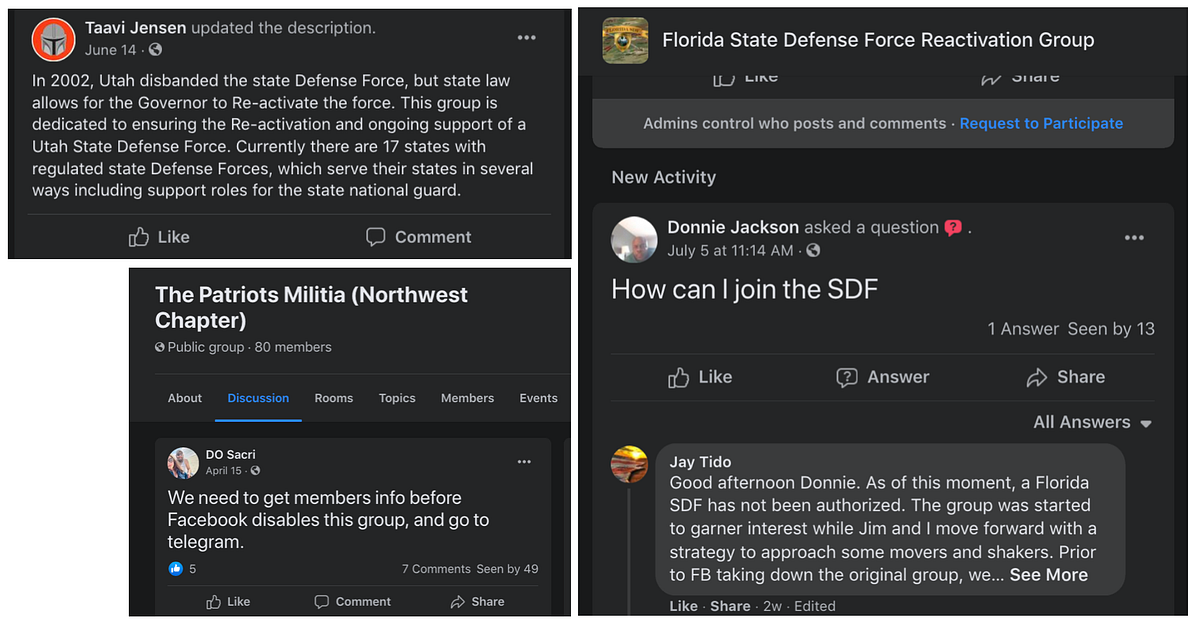
On MyMilitia, a forum board dedicated to connecting users to local and state militia groups, users have emphasized to each other that it is wiser to join local groups instead of national ones. A March 2 post in a thread on the forum states: “A word to the wise, speaking out of experience, keep it local and don’t join a national organization.” The user goes on to caution that members of national organizations “fold” and “roll over” to evade scrutiny. “Concealment is a big part of survival,” the user wrote.
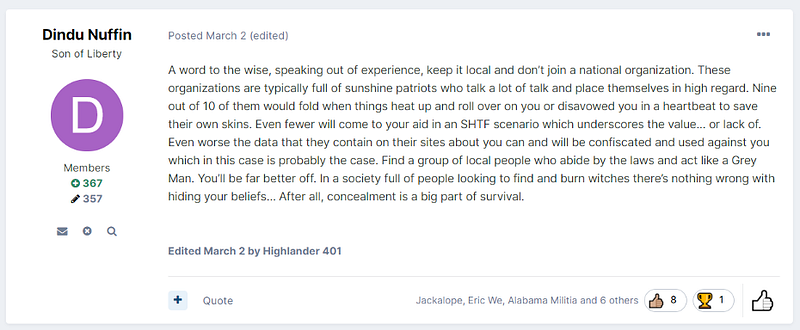
Selling merchandise and fundraising
Some militia movement groups have used their presences online to hawk products with messages they believe to be supportive of their cause. The amount of revenue generated by these efforts appears to be small, and the companies producing the merchandise are often one-trick ventures. One shirt design shared to a militia page identified by the DFRLab declares “I’d love a mean tweet and $1.79 gas right now,” a reference to Donald Trump’s Twitter usage and the low gas prices during his presidency. Would-be buyers are directed to a TeeSpring storefront where other similarly styled designs retail. Another page plugged a pro-gun rights shirt from the National Association of Gun Rights, following the trend of militia affiliated pages supporting larger right-skewed organizations.
The MyMilitia forum board has sought to raise funds by utilizing affiliate links to online retailers. Using a service called Flex Offers, the site offers users more than 45 links to retailers including sellers of clothing, firearms, ammunition, firearm accessories, camping gear, power tools, and cellphone services. The forum receives a portion of sales from buyers who use the links.
Directing audiences toward real-world events organized by other groups
Militia movement communities online have continued trends of directing their supporters to real-world events. Though some groups openly advertise field training exercise events (often listed with the shorthand FTX), many have sought to direct attention to events organized by third parties. Many such events promote a distinct pro-Donald Trump flare, and some have focused specifically on reimagining the events of the January 6 attack on the Capitol, in part by pretending the attack on the Congress was a peaceful event and claiming that federal officials are now exaggerating what happened to justify the prosecution of Trump supporters.
The #FreePoliticalPrisoners rallies that took place across the country on July 17, 2021 presented a recent, large-scale example. Look Ahead America, an “America First” organization run by Matt Braynard and Witold Chrabaszcz, former data strategists for the Trump campaign, was responsible for organizing the rallies. Forty former advisors to Trump preside as board members of the organization, and it has been known to spread conspiracy theories about voter fraud and “illegal votes.” The aim of the #FreePoliticalPrisoners rallies was to protest on behalf of those detained by the US Department of Justice and the Federal Bureau of Investigation for their affiliation with the January 6 insurrection at the Capitol. A page on Facebook claiming to be ready to “protect ourselves and the homeland locally” in its About section shared graphics with details on the event, while another page linked to the Look Ahead America website.
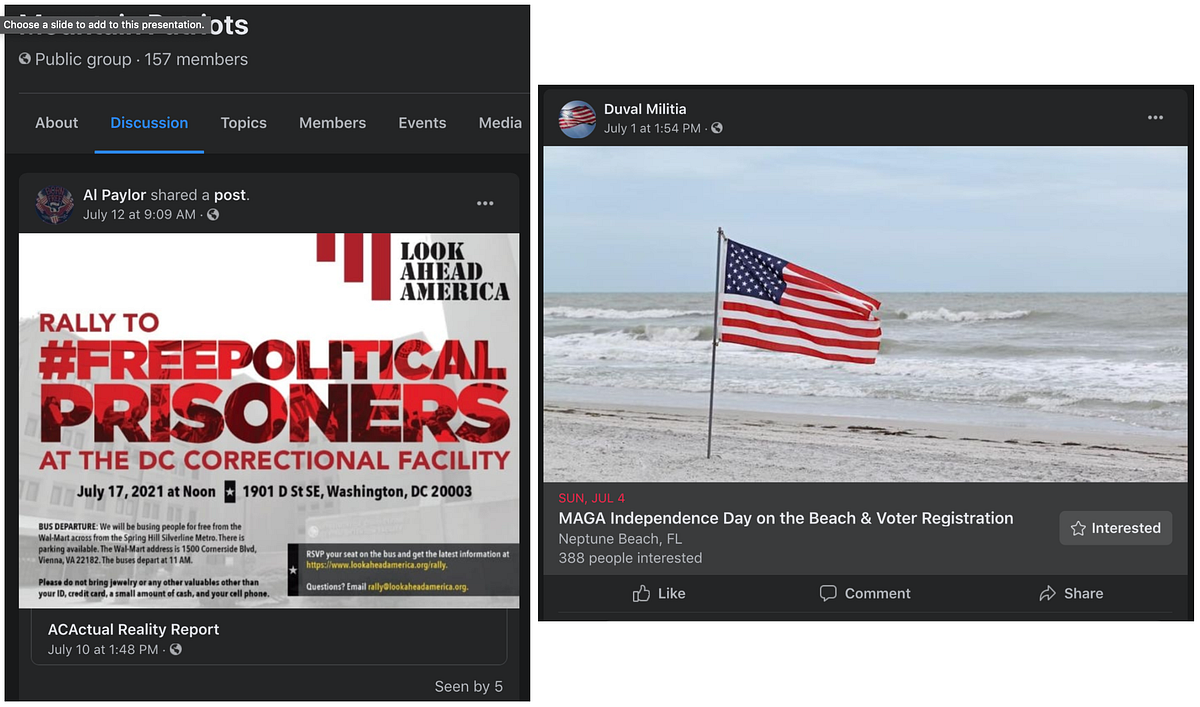
In militia-sympathetic communities, users have also directed attention toward events staged by organizations they perceive to be adversarial to their own causes, including demonstrations from African American armed groups and left-wing activist groups.
Five trends in online narratives
Mounting opposition to COVID-19 vaccines and pandemic-related public health initiatives
Militia movement communities online have sought to undermine confidence in COVID-19 vaccines, echoing the broader anti-government sentiments that fueled their outcries against restrictions on business and public gathering meant to curb the spread of coronavirus. Citing sources notorious for misinformation, users in these communities have railed against what they have perceived as government overreach and social control.

Many militia pages on Facebook have parroted COVID-19 conspiracy theories from far-right conspiracy pages and publications. These narratives often hyper-focus and villainize Dr. Anthony Fauci, current director of the US National Institute of Allergy and Infectious Diseases and the chief medical advisor to President Biden. Posts also urge viewers to resist vaccinations, amplifying the false narrative that COVID-19 vaccines are a dangerous ploy to control the masses.
On MyMilitia, a thread posted in May cited an article published by a conspiracy theory website notorious for health misinformation to allege that the “deep state” was planning false-flag style attacks to target individuals opposed to the COVID-19 vaccines. In this scenario, the government would orchestrate a national tragedy and attribute the tragedy’s cause to vaccine skeptics. A reply in the thread, which was “liked” by an administrator on MyMilitia, claims that vaccines are part of a broader conspiracy to depopulate the Earth. Another reply puts forward the idea that 5G cellphone towers may “trigger something” in the vaccines that causes harm to its recipients.
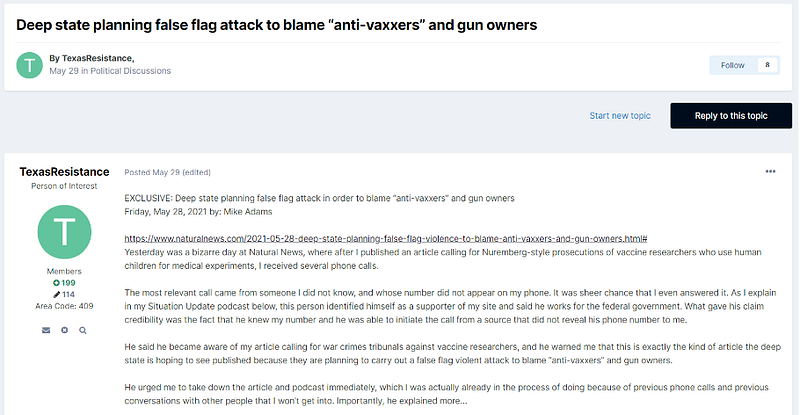
Cross-pollinating propaganda from extremist sources
On Facebook, militia pages and groups frequently amplify posts and articles from a plethora of far-right pages and publications, such as Ben Shapiro’s The Daily Wire. This is the primary method by which narratives spread in these spaces. Shared posts are often rife with disinformation, serving the two-fold purpose of furthering polarization and accumulating engagement for hard-right news blogs. As NPR reported on July 19, far-right outlets dominate Facebook, contradicting conservative claims that their voices are overly censored by social media companies. Popular themes include the supposed indoctrination of our children with critical race theory, claims of election fraud, and mocking the Democratic Party. Using militia pages as a news source is a part of a larger trend online, where consumers are growing to rely on non-news platforms for their information, such as WhatsApp.
Militia communities have also seized on blogs published by sites like Revolver News, which is operated by white nationalist sympathizer Darren Beattie, that have trafficked in conspiracy theories surrounding the US Capitol attack. The claims in the articles have been received by community members who have cited them to validate their broader conspiratorial claims about the government orchestrating the attack. Conspiracy theory websites have also circulated articles to validate a plethora of broader false claims about the COVID-19 pandemic, the federal government’s attitude toward white Christians, and racial justice initiatives.
In some cases, groups online calling themselves “militias” have circulated extremist content with antisemitic, racist, and violent messages. On Telegram, a group chat named “Tyrant X Illinois Militia” has increasingly tilted toward extremist ideology. Its owner, under the name “Cody Fury,” has shared neo-Nazi imagery and memes containing antisemitic tropes.
Encouraging anti-government sentiment in response to anti-extremism programs
In the face of heavy backlash against the proliferation of virulent content on its platform, Facebook ramped up content moderation against militia groups and pages. Recent efforts include an extremism warning, as well as increased user takedowns. Militia pages on Facebook regularly express outrage at these initiatives, echoing paranoid claims from far-right celebrities that these initiatives purposefully stifle conservative voices. They also link moderation decisions made by private tech companies to Democratic lawmakers, implying the two are working together to hide the “truth” and usher in an era of apocalyptic totalitarianism. The DFRLab identified multiple fearmongering disinformation narratives, including the debunked theory that the Democratic National Committee will “censor text messages” from COVID-19 extremists. This distrust propels the militia movement’s shift to alternative platforms, like Gab and Telegram.
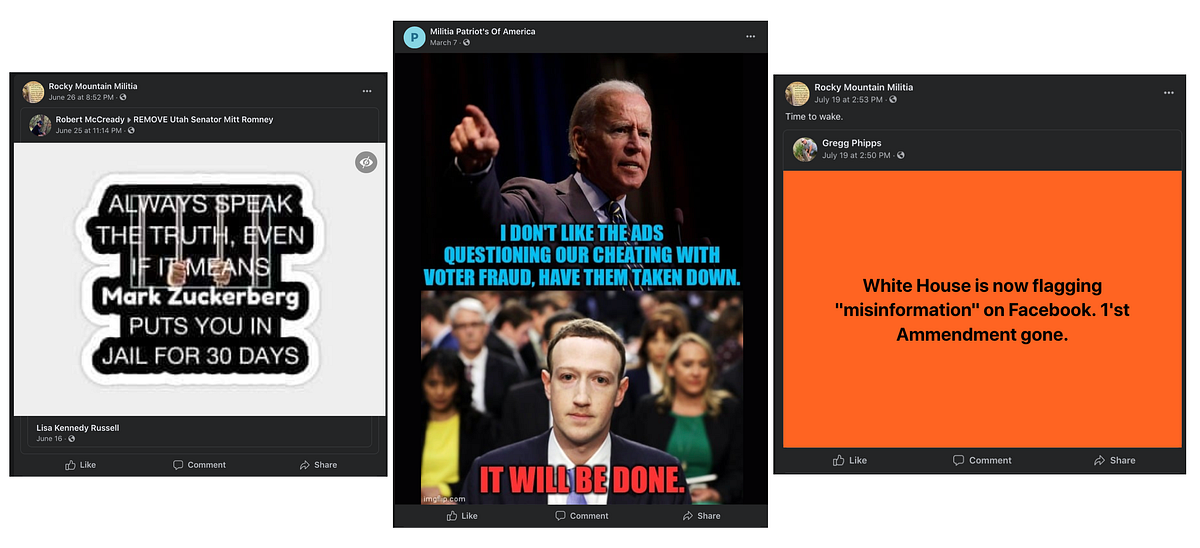
In a blog post, Oath Keepers leader Stewart Rhodes vented about an anti-extremism video that was allegedly shown to US military members. “Keep in mind that when the left uses the term ‘white supremacist’ they really mean populist, patriot, Christian, conservative,” Rhodes wrote in a post on the Oath Keepers website. “White supremacy is just the label they apply to anyone who opposes their totalitarian globalist agenda. It’s a smear tactic.”
As the Biden Administration and federal government agencies consider options for combatting domestic extremism, extremist movements have sought to preemptively discredit and fearmonger around any such efforts.
Attacking racial justice movements and initiatives
Most militia movement narratives surrounding racial justice efforts on Facebook pages, websites, forums, and alternative social media platforms originate from far-right media sources not directly related to any militia movement. The pattern reflects broader trends on social media sites and media narratives, over which right-wing publications have established a degree of dominance. In line with scores of other right-wing movements, militia movement groups have shared and circulated content related to critical race theory with an almost universal negative slant.
One narrative within militia movement communities claims that individuals with conservative views are systematically targeted by racial justice efforts to be kept from participating in society, citing narratives and content popular in broader conservative communities online. For example, an article published by The Federalist claimed in March that a proposed California bill will “[remove] cops who express religious or conservative beliefs” and was shared in a small Facebook group with “militia” in its title. As The Sacramento Bee reported, the bill’s wording has been contested by experts on both sides of the aisle, a fact that the Federalist article and title omit.
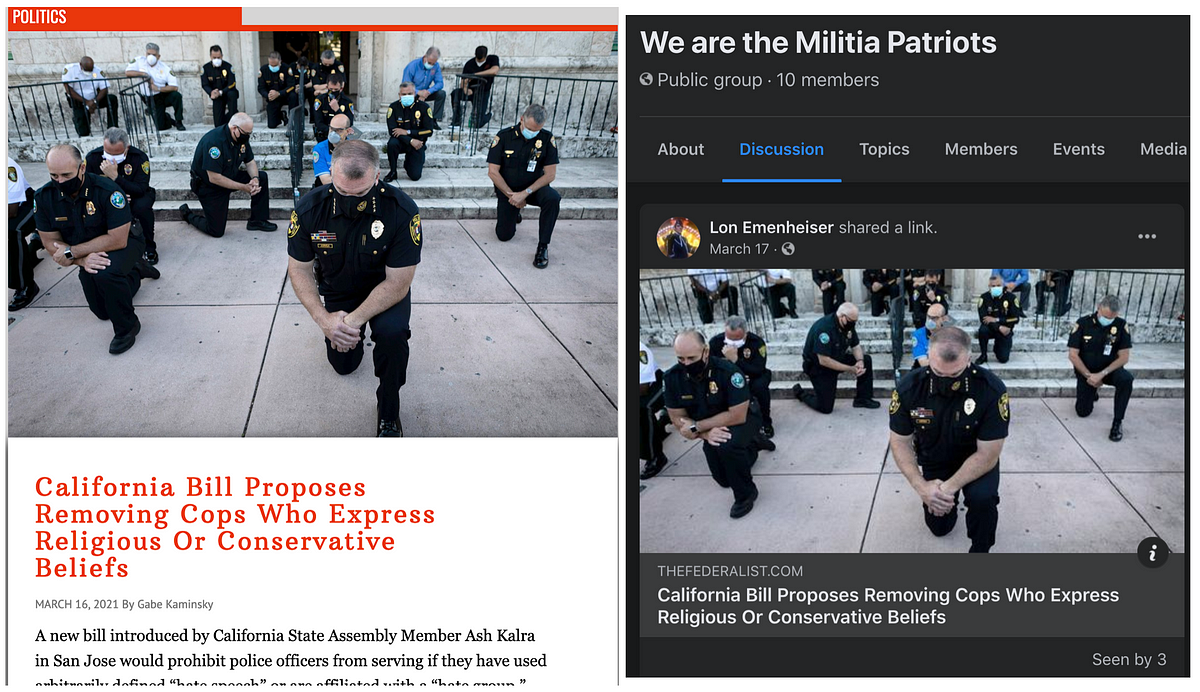
Rehashing 2020 election conspiracy theories
Mirroring trends in far-right and conspiratorial social media communities, militia movement supporters have remained fixated on claims that President Joe Biden was elected illegitimately.
On Facebook, militia pages have pushed conspiracy theories alleging that the 2020 presidential election was rendered illegitimate by widespread fraud and illegal votes. Regional groups online labeling themselves with “militia” shared claims of alleged voter fraud in their area. For example, the group Arizona First Militia shared a post from Merissa Hamilton, who lost the race for mayor of Phoenix in 2020, citing claims of voter fraud in Arizona. According to The Guardian, counties in the state have found very few instances of fraud, and this is just the continuation of a narrative that has been rehashed multiple times since November 2020.
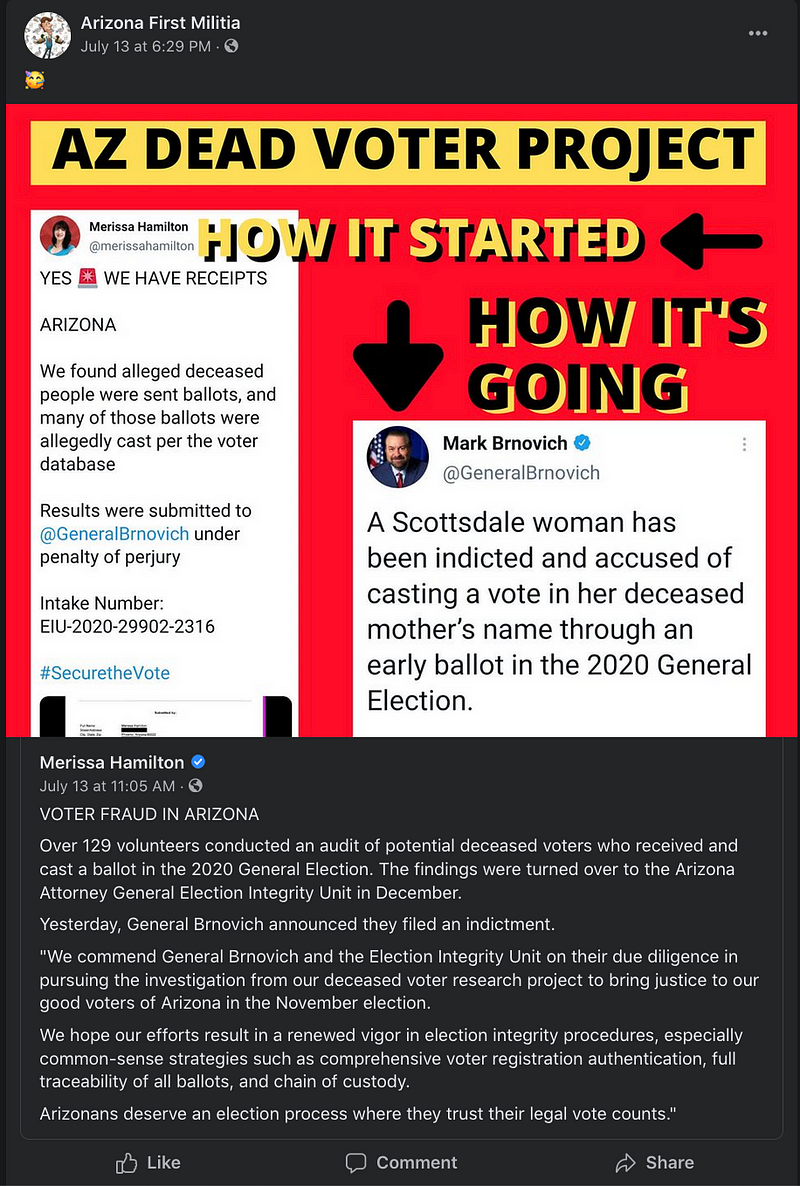
Similarly, in an Oath Keepers group on Gab, on May 28, one user shared a link to a website calling for the 2020 election results to be investigated and subjected to a “forensic audit” in Pennsylvania.
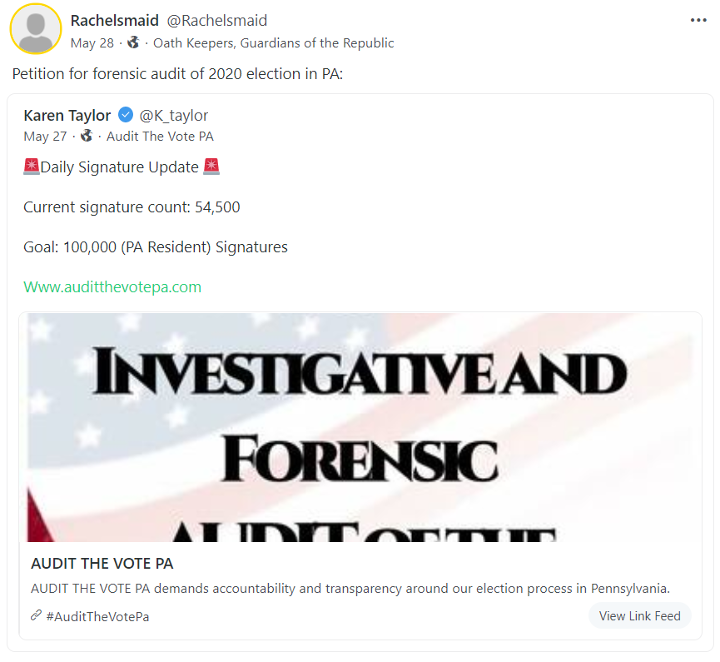
Avani Yadav is a research intern with the Digital Forensic Research Lab.
Jared Holt is Resident Fellow with the Digital Forensic Research Lab.
Cite this case study:
Avani Yadav and Jared Holt, “Eight trends in online militia movement communities since the US Capitol riot,” Digital Forensic Research Lab (DFRLab), August 3, 2021, https://medium.com/dfrlab/eight-trends-in-online-militia-movement-communities-since-the-us-capitol-riot-29ea5f1175b.
Follow along for more in-depth analysis from our #DigitalSherlocks.

